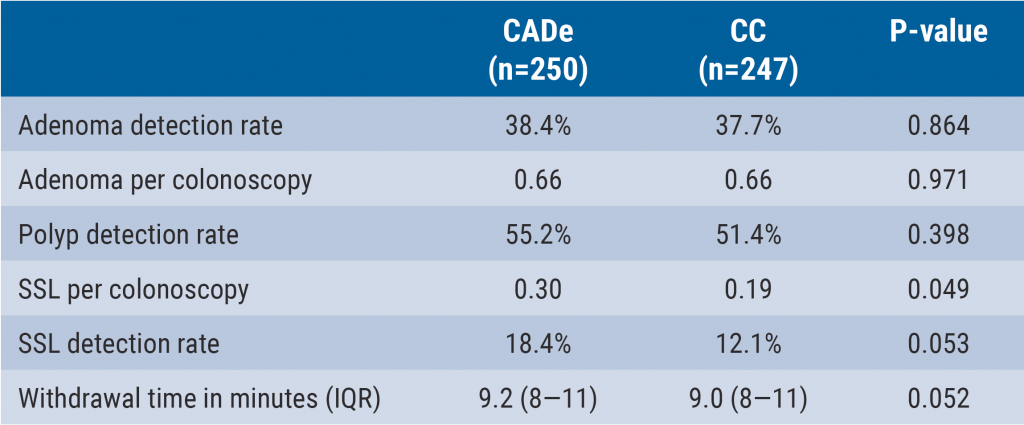https://doi.org/10.55788/c9e7ad03
Prof. Silvio Danese (Vita-Salute San Raffaele University, Italy) assessed the efficacy of mirikizumab, a humanised monoclonal antibody against IL-23p19, in participants with moderately to severely active UC based on the number and types of failed targeted immunomodulators [1]. The investigators examined the influence of prior use of TNF inhibitors, vedolizumab, and tofacitinib. Participants from the LUCENT-1 study (NCT03518086; n=1,162) who responded to mirikizumab induction therapy at week 12 were re-randomised to mirikizumab or placebo through week 52 in the LUCENT-2 trial (NCT03524092; n=544). Among other endpoints, clinical response was evaluated, which was defined as a decrease in the modified Mayo score of ≥30% and ≥2 points from baseline, a decrease of ≥1 point in the rectal bleeding subscore (RBS) or an RBS of 0 or 1. At baseline, 683 participants were targeted immunomodulator-naïve, 245 had failed 1 prior advanced therapy, and 234 had failed 2 or more targeted immunomodulators. In addition, 36.3% of the participants failed TNF inhibitors, 18.8% failed vedolizumab, and 15.2% failed a TNF inhibitor plus 1 other agent, either vedolizumab or tofacitinib.
At week 12, a higher percentage of immunomodulator-naïve participants achieved clinical response with mirikizumab compared with placebo (69.8% vs 50.6%; P<0.001). The same findings were observed for the other subgroups when compared with placebo, including for participants who failed 1 prior therapy (63.9% vs 36.9%; P<0.001) and those who failed 2 or more therapies (45.3% vs 20.8%; P<0.001). Regarding the type of targeted therapy, a higher percentage of participants who previously failed TNF inhibitors achieved clinical response compared with placebo (54.2% vs 26.8%; P<0.001). The same trend was found for participants who failed vedolizumab or TNF inhibitor plus another agent.
Similar trends were observed for other efficacy endpoints, namely, symptomatic remission, clinical remission, and endoscopic remission. Importantly, these results were consistent for the maintenance population at week 52.
In short, mirikizumab outperformed placebo in participants with UC across all efficacy endpoints, as an induction or maintenance therapy, irrespective of the number and types of failed advanced therapies.
- Navabi S, et al. Effect of mirikizumab on clinical and endoscopic outcomes based on prior advanced therapy failure in patients with moderately to severely active ulcerative colitis. OP040, UEG Week 2023, 14–17 October, Copenhagen, Denmark.
Copyright ©2023 Medicom Medical Publishers
Posted on
Previous Article
« ARTEMIS-UC: New kid in town for UC Next Article
Rapid response to upadacitinib boosts outcomes in severe Crohn’s disease »
« ARTEMIS-UC: New kid in town for UC Next Article
Rapid response to upadacitinib boosts outcomes in severe Crohn’s disease »
Table of Contents: UEGW 2023
Featured articles
SEQUENCE: Risankizumab doubles endoscopic remission rates compared with ustekinumab in CD
What’s New in Artificial Intelligence
Digital intervention relieves symptoms and improves QoL in IBS
GastroGPT: Successful proof-of-concept study of gastroenterology-specific large language model
Other Therapeutics and Outcomes
Primary results from MAESTRO-NASH trial: resmetirom efficacious for NASH
Apraglutide: Advancing the treatment of short bowel syndrome
Endobiliary radiofrequency ablation in pCCA: a pilot study
Raising awareness for microscopic colitis: disease course and predictors
Outcomes of IBD Trials
DIVERSITY1: Filgotinib results in Crohn’s disease leave investigators puzzled
SEQUENCE: Risankizumab doubles endoscopic remission rates compared with ustekinumab in CD
Guselkumab provides benefits in UC regardless of advanced therapy history
INSPIRE: Risankizumab meets all efficacy endpoints in UC
Risankizumab resolves extraintestinal manifestations in CD
Obefazimod takes the spotlight as promising UC treatment
Rapid response to upadacitinib boosts outcomes in severe Crohn’s disease
LUCENT trials: Mirikizumab works in UC, regardless of targeted therapy history
ARTEMIS-UC: New kid in town for UC
Breakthroughs in Colorectal Lesions
Safer removal of large polyps with cold snare technique
Higher recurrence rates with cold snare EMR than with conventional EMR
How to deal with at-risk patients above the CRC screening age limit?
European CRC screening needs to be revised
Advances in Upper Endoscopy and Colonoscopy
Epinephrine boosts efficiency in gastric ESD
Artificial intelligence-aided colonoscopy did not improve outcomes in Lynch syndrome
Can computer technology improve our everyday colonoscopy results?
Is AI-assisted colonoscopy ready for clinical practice?
Should we use E-SEMS or EVT for traumatic oesophageal perforations?
Related Articles
December 7, 2023
Epinephrine boosts efficiency in gastric ESD

December 7, 2023
Can computer technology improve our everyday colonoscopy results?
© 2024 Medicom Medical Publishers. All rights reserved. Terms and Conditions | Privacy Policy
HEAD OFFICE
Laarderhoogtweg 25
1101 EB Amsterdam
The Netherlands
T: +31 85 4012 560
E: publishers@medicom-publishers.com

